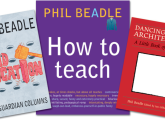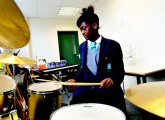TV presenter, journalist, campaigner and general tech-head Maggie Philbin is determined to open up doors for young people that remained firmly closed during her own secondary education
Like most people of my age, where I went to secondary school depended on one thing above all else: the dreaded 11+. To this day I can remember taking that exam. We had to travel to another school and a teacher tried to ease our nerves by playing ‘Simon Says’ with us. We were nervous, too – at least, I certainly was. There was a definite sense of pressure on us, and although we didn’t really understand why, we knew how important it was that we passed. My dad had had me practising mental arithmetic for weeks beforehand – neither he nor my mum went to university, and they were both keen that I should make the most of my opportunities.
As it happened, I did pass, which enabled me to attend Evington Hall in Leicester (the name changed to St Paul’s while I was there). It was an all-girls convent grammar at the time, and while I know that you do hear some horrendous stories from people who had a Catholic education, I have to say that for the most part, my teachers were fantastic. Sister Catherine, the head teacher, was terrific, in fact. She was very aspirational for all of the girls, and we were encouraged to aim high.
That being said, though, the outlook we were given on the world was very narrow. If you were good at science, then naturally you would work towards becoming a doctor or a vet; there was no mention of, for example, engineering, or any of the other interesting paths that were there to be explored. If, like me, you struggled with something like chemistry, well then you were siphoned off into humanities and the arts, even if you were brilliant at maths or physics. The emphasis was firmly on academic excellence, and the real world of work and business was kept away. And the truth is, I think this separation is still a problem in schools today. Money has been removed from careers education; the focus is on GCSE achievement, especially in English and maths; and non EBacc subjects that bring a practical element to learning, like D&T, are being sidelined, with the result that young people are still leaving full time education unaware of all the amazing things they could do with the rest of their lives.
It’s this need to connect children with the outside world while they’re still at school that has inspired my work with TeenTech. We organise interactive science and engineering events for teenagers – giving them real, immersive learning opportunities that help them understand how they could get involved in technology as a builder and creator, rather than just as a passive consumer. Young people are marvellous – if they have a goal, then they have an immense capacity to plug away at dull, tough subjects in order to attain it. But they need to make that connection, to see people actually doing something. It’s no accident that many of the kids who do go into STEM-based careers tend to have parents or other relatives who are already in the relevant industry. I don’t want those children who have the potential to be innovators of the future – but don’t happen to have a family member to inspire them – to miss out.
For a long while at school, I was the kind of student who was very good indeed at certain subjects, but below average at the others – because when anything required a bit of effort, I would just kind of busk my way through. It wasn’t until I was in my O-level year that a new French teacher took me to one side and told me with simple certainty that I was capable of so much more, if I would only try. It sounds obvious now, but then, it was a revelation. I left school with three As at A-level, and I wouldn’t have done that without her. That’s when education is at its best – when someone believes in you and you suddenly realise you are capable of so much more than you’d previously believed. It happens all the time at TeenTech events; kids who don’t normally excel, excel. And the thrill both they and I get from that is immense, every single time.
About the author
Maggie Philbin has worked in radio and television for 30 years on a wide range of science, medical and technology programmes, and is a co-founder of teentech, which organises events to help young people realise the career potential of stem subjects.










TV presenter, journalist, campaigner and general tech-head Maggie Philbin is determined to open up doors for young people that remained firmly closed during her own secondary education